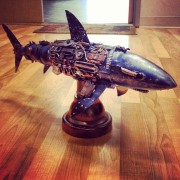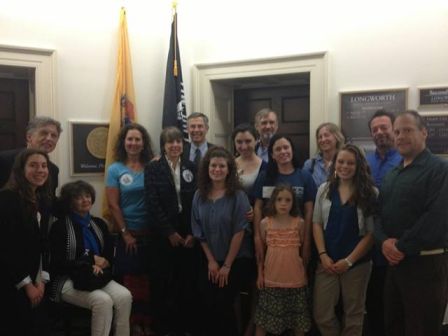By now, you have all been bombarded by the phrases “go green” and “be sustainable” in the media, in advertising and from peers, but have you heard of the phrase “go blue?”
Not to give you all horrible SAT flashbacks, but “blue” is to the ocean as “green” is to the environment. So, when I attended the Blue Vision Summit in Washington, D.C. last week, I expected to learn more about ocean policies and helping to protect the marine environment, but I never expected to find myself submerged so deeply into ocean issues with such an interesting group of people from all over America and abroad.
Blue Vision Summit (BVS) is held every other year in Washington, D.C. and serves as one of the nation’s largest ocean movement strategy conference. BVS brings hundreds of individuals concerned about the ocean and marine conservation together to take unified action on key issues and policies impacting the ocean. Each Summit reserves one day for advocates to meet and educate members of Congress on Capital Hall.
BVS is organized by Blue Frontier Campaign, a group, founded in 2003, that “highlights the economic, environmental, recreational and spiritual benefits of healthy and abundant seas…through outreach and service to hundreds of marine grassroots organizations.” Blue Frontier works to unite grassroots groups together with “private, civil and governmental organizations for the purpose of creating a visible and effective blue movement to advance sound policies and practices from coastal watersheds to deep ocean waters.”
Blue Vision Summit 2013 focused on three areas: responding to coastal disasters like Superstorm Sandy in ways that will protect ecosystems, making climate change a blue issue, and highlighting youth leadership for ocean conservation.

BVS carried out these themes in a variety of different ways. The first night of the conference, we all learned about marine debris from “artivists” (artist + activist = artivist) or “creative conservationists” who showed us their work. Many of the artivists used plastic debris collected on their local beaches to make beautiful art with a message.
We also watched a number of interesting documentaries about ocean conservation issues. My favorite was a short animated film called the “Song of the Spindle,” about a conversation between a man and a whale. I also liked a documentary about the Nightingale Island Disaster, put together by Ocean Doctor, a nonprofit founded in 2004.
I enjoyed every day of Blue Vision Summit, especially Healthy Ocean Hill Day on Capital Hill, and came home with what I think are two very important take aways:

One: Every state is a coastal state
BVS had representatives from 24 states, Borneo, Canada and Sierra Leone, a small country in West Africa northeast of Guinea, southeast of Liberia and southwest of the Atlantic Ocean. One of the states that brought a number of ocean advocates was Colorado. Well, yes, there is no ocean in Colorado, but these passionate individuals realize that every action we take ultimately has an impact on the ocean. Fertilizer and pesticides are carried from stream to stream, river to river, and eventually the ocean. This reason, as well as many more, is why the Colorado Ocean Coalition was formed to protect the ocean “from a mile high.”
Another interesting partnership that was showcased at BVS was that of Iowa farmers and conservationists in the Gulf of Mexico. Watch the segment of the video Ocean Frontiers below to see how the farmers came to realize that the Mississippi River carried their actions all the way to the Gulf of Mexico:
Two: Kids are Kicking Ass for the Ocean

Towards the end of the conference, Blue Frontier organized a panel of youth advocates to speak about their work to save the ocean. Now, the environmental community is awesome for so many reasons, but my favorite has to be how we all inspire and motivate each other. I was so inspired by the 7th grader I spoke with a month or so ago about plastic pollution and by the young ocean advocates at Blue Vision Summit last week. These kids are not waiting until they grow up to save the ocean, they are working hard at marine conservation now. They were also tired of people saying they are the advocates of the future; they are working for change right now. The panelists from Teens for Oceans, The Harbor School, and 5 Gyres believe that youth make excellent advocates because of their curiosity, fresh perspective and inspiration from the world around them. One panelist spoke about how adults feel jaded and frustrated by marine issues, while kids feel empowered and see problems as an opportunity to make a positive change.
After three days at Blue Vision Summit, I felt empowered by the advocates around me, young and old, and all of the different types of people: artists, film makers, policy makers, government employees, nonprofit volunteers, to do the best I can do to “go blue.”
18 replies on “A 20-something Environmentalist at Blue Vision Summit 4”
Lindsay,
This is an awesome blog, I feel like you, very motivated and inspired after the BVS. It was an inspirational group for sure and my whole family was immediately accepted and welcomed. We all learned so much and feel we must share all the information with others. As Kenzie said she wants to start a n ocean group here in our town, so we are researching and shooting for July. I may have to start a blog to keep all our blue friends informed on Kenzies efforts and progress!
LikeLike
Thank you so much for your kind words, Beth. It was so nice to meet you and Mackenzie. She is such an inspiration to us all.
LikeLike
It sounds like a terrific and informative event. Thanks for your post.
LikeLike
Thank you so much for reading!
LikeLike
Well written Lindsay. It was nice to meet you at bvs4, you make a great roommate! I dream of making my blog as informative as this!
LikeLike
Erika, thanks so much for reading. It was nice to meet you too. I wish we spent more time together, you’ll have to let me know next time you’re on the east coast 🙂
LikeLike
Great post, Lindsay. The good news is your takeaway number 2 — that younger ocean advocates are not waiting to help save the seas. Hopefully their effective passion will inspire others old and young to take positive action. It would be awesome to see the marble halls of Congress packed with ocean advocates from every state at the next Blue Vision Hill Day.
LikeLike
I completely agree. BVS was half way there this year, I hope in 2015 that goal is accomplished…and I hope that just as many young people, if not more come out to the next one!
LikeLike
Great Post, Lindsay!
It was wonderful meeting you at BVS4. I loved the collaboration among so many passionate conservationists, so they have a bigger collective voice.
You were wonderful, and I love your blog!
LikeLike
Diane, thank you so much! That is so sweet of you, you just made my day.
LikeLike
Thank you for reporting on this conference. I grew up about 50 meters from the Gulf of Maine, and spent most of my formative years in, on, or near the ocean. Even worked on a whale-watching boat for a couple of years. I’ve seen firsthand the devastation of overfishing, and it’s easy to become despondent when confronted with the tragically long list of threats to our seas. It’s reassuring to know that we’re not alone in our concern and our activism.
After ten years in landlocked Hungary, we’ll once again be living on the water, this time the Mediterranean. Can’t wait.
LikeLike
I wish you the best of luck on the Mediterranean and I thank you so much for reading. You are definitely not alone in this fight!
LikeLike
Lindsay, Well said. You helped to make the message to the Congress that people from all parts of the country, every state, care about our oceans. Politicians often assume we don’t care because they hear so much on the top tier issues and private interests. The oceans belong to everyone and when everyone speaks in one voice to save it Congress sits up. Thanks to you and your colleagues 100 (a hundred) meetings with Congressional Reps and Senators will held all in one day. That was historic. The buzz on the hill was the ocean folks are here, did you get to meet one? When constituents speak to their pol about the importance of clean water/healthy oceans, you make their work easy. You make their work something they can brag about with their families after hours. Together we have created a national ocean policy that is getting all the many silos of government to work together. This saves on reinventing many wheels. Soon Washington politicians will create a national ocean endowment trust to give out many small grants for ocean work funded by the oil drillers.
LikeLike
Rob, thank you so much for your well thought out and articulate comment. I did get to meet a few Reps and Senators: Rush Holt, Jon Runyan and Frank Pallone. I share your fear of where money comes from for environmental/marine conservation projects. It is our duty to say no to funding from companies that are not socially responsible.
LikeLike
Fantastic blog, Linsay. You captured this inspiring event so well. Keep kicking ass!
LikeLike
Karen, thank you so much! I will do my best to keep kicking ass!!
LikeLike
Well said Lindsay! I’m re-inspired by your post. I hope you don’t mind if I share it on the National Ocean Policy facebook page we at the Healthy Oceans Coalition support! I look forward to seeing you at the next BVS4 and hearing about all you’ve accomplished – of THAT I have no doubt!
LikeLike
Sarah, thank you so much for such kind words. I really appreciate your comment. Please feel free to share everywhere and anywhere! I look forward to seeing you too.
LikeLike